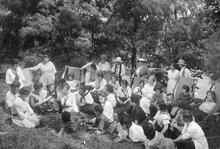Esther Jane Ruskay
Esther Jane Ruskay argued passionately for a return to traditional religious practice and study. Ruskay was the first woman to give a talk from the pulpit of Temple Emanu-El, the noted New York Reform synagogue. In a speech given in 1893, she began by chiding the audience for implying by that topic that Judaism was dead, criticized the Ethical Culture movement as a watered-down version of Jewish values, and argued that Jewish children should study Hebrew with the same seriousness that they gave their classical training in Latin and Greek. She also wrote articles on Jewish life that were published in a number of newspapers and that the Jewish Publication Society later collected as Home and Hearth Essays, published in 1902.
Article
Esther Jane Ruskay was a distinguished and outstanding writer and speaker in the Jewish community before the turn of the century. Her articles on Jewish life appeared in numerous newspapers, and a collection of her writings, Hearth and Home Essays, was published in 1902 by the Jewish Publication Society.
Born in New York City in 1857 to Goldie (Webster) and Abraham Baum, Esther, a second-generation American, was the eldest of ten children. As an adult, she was actively involved in establishing many Jewish communal institutions including the New York section of the National Council of Jewish Women, the Educational Alliance of the Lower East Side, and the Young Women’s Hebrew Association.
Ruskay has many firsts to her credit, including being a member of the first graduating class of Normal College (now Hunter College) in 1875, and being the first woman to speak from the pulpit of New York’s flagship Reform synagogue, Temple Emanu-El. She was a vocal supporter of conservative Jewish values at a time when Judaism and Jewish ritual practice were being criticized as out-of-step with the modern world. Ruskay’s views are most forcefully expressed in a talk she delivered to the founding meeting of the New York section of the National Council of Jewish Women on May 9, 1893. She opened her talk by chiding the topic assigned her, “The Revival of Judaism”:
Before starting to write my paper, I looked up the definition of “revival” and found it to mean “a return to life—an awakening.” Clearly then, Judaism was either dead or sleeping and needed to be awakened and to me was deputed the task. I did not look up the word “Judaism,” I thought I knew what that meant and if I did not there was no danger of my remaining unenlightened.
Ruskay continued by criticizing those who look elsewhere for ethics and comfort:
We have in Judaism and the Jewish life all of divine comfort and consolation—yet we pass it by and seek in Ethical Culture and its kindred cults an answer to our prayers. Ethical Culture is neither more nor less than the expression of the wide humanitarianism of the Mosaic creed, as the ethics of all religions are the outcome of their faiths. Ethics is the tail of the kite. Religion is the kite itself.
In defense of Hebrew as the language of prayer, she went on:
You say, Hebrew is a mere jumble of words without meaning. It should not be. It ought not be. Why not teach it, beginning the study in the Jewish home under Jewish teachers as in the olden days? It can be taught to our children and it should be given them in the same spirit of educational fervor that we give the Latin and Greek for their classical training. ... Now then, must we wait until other nations have taken it up and made the language theirs? Will there be value in Hebrew only after we recognize the value to the outside world? I trust not since the study of Hebrew would do more to foster in us soulful sentiment for the Bible and respect for the noble traditions of our race than all the so-called culture of all the universities combined.
Esther Ruskay was married to Samuel J. Ruskay. They had three sons, Burrill, Ceil, and Everett. Esther Jane Ruskay died in 1910 at age fifty-three of a brain tumor. (The New York Times reported that she died on October 30, 1907, while a family history says she died in 1909).
Selected Works by Esther Jane Ruskay:
Hearth and Home Essays (1902).
Rhymes and songs for my little ones (1896).
“The Revival of Judaism.” Speech delivered at founding meeting, New York section, National Council of Jewish Women, May 9, 1893.
Hearth and Home Essays and Rhymes and songs for my little ones are available as eBooks at http://onlinebooks.library.upenn.edu/webbin/book/lookupname?key=Ruskay%2C%20Esther%20J.
AJYB 6 (1904–1905):178, 10 (1908–1909):127.



